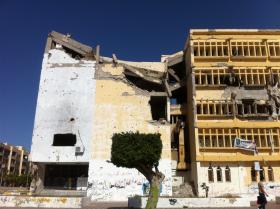The Gun Threatens Free Speech in Libya
“There is no free media in Libya because there are weapons all over the country,” says Emad Gadara, the Programme Manager at the state radio in Zawiyah, a city West of Tripoli. The road to Zawiyah had been blocked just before my visit by rival militias, following a violent confrontation. Zawiyah itself still looks like a battleground, which it was in 2011. At one point, my taxi driver suddenly shows off a handgun: “to defend myself”.
It’s not an atmosphere conducive to free reporting.
Emad was put back in charge of the station’s output after the revolution. “I have heard commercial stations in Tunisia and elsewhere and I know what good radio should sound like. Our output is not competitive,” he says. “We have an old mentality. We need complete change. But we are rooted in our old ways.”
Everything in the station is old. The sound archive is stored on tape but the library’s tape recorder is broken. The studio, sound proofed with old carpet, has a small, salvaged sound desk. The few PCs have viruses and the station is largely crewed by volunteers.
Radio Zawiyah was set up in 1999 by Al Watanya, one of Gadaffi’s national broadcasters and still firmly under state control. When the revolution started, Emad, who was then the station manager, supported it, passing information secretly to international journalists. Before Zawiyah fell, he was arrested, taken to Tripoli, imprisoned and tortured for 6 months. “I was a special case,” he says through a cloud if cigarette smoke and an interpreter. “They thought I was one of them… so they treated me harshly.” He denied the charges but they played him recordings of the phone calls he had made. “They beat me. They shattered my nose…. and electrocuted my testicles.” He still receives treatment, paid for by the new Libyan government, but he may never have children.
Now he is back and energetically works to bring the station’s output in to the modern world. He hosts a political discussion programme and the station carries other programmes – often offered by people in the community – covering social and cultural affairs, news and analysis.
But the station is still bound by all Gaddafi’s laws and bureaucracy. Employees are civil servants and cannot be dismissed. Salaries are paid by the Ministry of Culture, directly in to employees accounts. There is no budget for the station. There is some meagre advertising, which pays the coffee boy. There are no producers and no reporters. There are just enough announcers. Of the 50 staff at the station, only half are paid and none of them work on output. The salaried staff are engineers or administrators or managers.
Nobody really knows who in government is now responsible for the station. The Ministry of Culture pays salaries but a new Ministry of Media has been created. It has no budget. Some members of the elected Local Council feel they should own the station but all they have provided so far is a new transmitter. There is no agreement about a way forward.
And then there is security. Just before my arrival, 50 of the armed, young militiamen, who had blocked the road to Tripoli, stormed the station manager’s office. They were furious, because an announcer at the station had described the conflict on the road between two rival tribes as a “family feud”. The armed men were incensed because they felt they were defending themselves against law breakers.
The station went off air. The leader of the militia ordered his men away and broadcasts were only resumed when the leader of the militia agreed to do an interview.
“I work as a presenter on an evening programme, says Emad. It finishes at 23.30. I interview responsible people and government officials. I go back through the empty streets after dark. I can expect anger from anyone who does not like what we say on air. They can attack me.” The morning of my visit a woman presenter does not arrive to present her programme because she is so worried by the militia’s attack.
At the station, there will be little further progress without fundamental change. Old laws need to be repealed. The state broadcasters need to hire their own employees, not civil servants. Budgets need to be devolved. Of the 4,000 employees in Libyan state broadcasting, only a fraction is needed. Numbers should be reduced and, those who do not work, paid off. A new system of regulatio is required to underpin the independence of public broadcasters.
Outside the public sector, Libyan media flourishes and there is a freedom of speech unknown for over 40 years. Private stations proliferate and journalists display an appetite to agree codes of conduct. Trainers are looking for Libyans who display an aptitude for journalism. But the key attribute that’s needed right now is bravery. Guns are everywhere and the intimidation is palpable.
http://freespeechdebate.com/en/discuss/free-speech-and-the-gun-in-libya/
Jerry Timmins, Managing Director GMT Media Ltd

